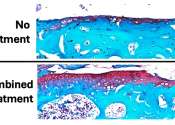Radiotherapy with hormone therapy can help some advanced prostate cancer patients avoid chemotherapy
Radiotherapy can be used alongside hormone treatment, delaying the need for chemotherapy and therefore significantly protecting their quality of life for some patients with advanced prostate cancer, according to researchers ...
7 hours ago
0
0









